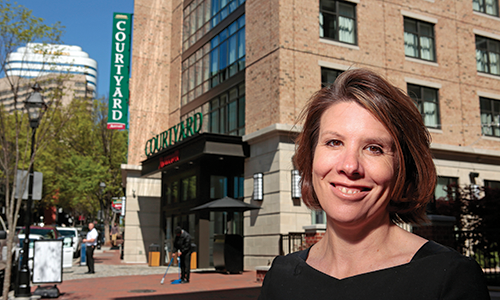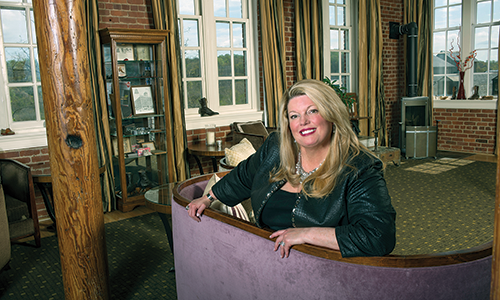Take an iconic travel slogan in a state blessed with natural beauty and history, increase funding for marketing and infrastructure, and what do you get?
A second-to-none tourism industry.
That’s the industry’s goal. But are we there yet? Not quite. While Virginia is competitive, it hasn’t ascended to the top of the Ferris wheel, say industry executives. Nor is it a tiny teacup player. What holds Virginia back, they say, are several challenges: outdated product, the need for improved infrastructure such as sports arenas and convention centers, and more marketing funds to make a push into affluent Northeastern markets such as Boston and New York.
By many measures, Virginia’s tourism industry is thriving. In 2014, domestic travelers spent $22.4 billion on lodging, transportation, food and recreation, supporting 216,900 jobs and generating $1.5 billion in state and local taxes.
In fact, Virginia ranks ninth among the 50 states and Washington, D.C., in domestic traveler spending. Yet the state falls to No. 21 based on its 2014 state budget of $18.6 million for tourism. That figure pales when compared with heavy-hitting tourism states such as Florida and California that spent nearly four times as much — $69.4 million and $64.4 million in 2014 — according to the U. S. Travel Association.
The Old Dominion is home to many large hospitality companies. Hilton Worldwide Inc. in McLean is a global giant with holdings in 100 countries. It, along with other players such as Apple REIT Hospitality, Shamin Hotels and Cornerstone Hospitality, are investing in new properties in Virginia.
Sparking the growth is the rise of millennial travelers and their families, an increasing recognition of Virginia’s award-winning culinary scene and a heightened focus on authentic experiences — from feasting on Virginia’s homegrown oysters to cycling from Richmond to Washington, D.C.
With the potential for new growth, though, are operational pressures. The industry struggles to find enough skilled people to staff positions. It’s the target of cyber criminals intent on hacking the hotels’ large cache of personal credit-card data. Throw in increased competition from Airbnb and other players in the short-term online rental industry, and it becomes apparent that the industry behind those carefree vacation images is anything but carefree.
“It’s not fun and games,” says Mark Carrier, president of B.F. Saul Hospitality Group in Northern Virginia and the 2015 vice chairman of the American Hotel and Lodging Association. The AHLA is a national association representing the 1.8 million-employee U.S. lodging industry. In Virginia that includes 1,495 properties and 45,092 lodging jobs.
“It’s a real business with a real return on investment that benefits the community. Things like the governor’s focus on Dulles Airport is huge when you think of that as a massive piece of public infrastructure and the need to get more passenger traffic through.’’ Carrier was referring to the $50 million in the state’s recently passed biennial budget that’s earmarked for the Metropolitan Washington Airports Authority, which manages Dulles. The idea behind the money is to cut fees charged to airlines to make Dulles more competitive, driving up domestic traveler traffic.
That’s the kind of public support, say industry insiders, that will help Virginia take tourism to the next level. During a recent gathering of C-suite executives for a roundtable discussion on Virginia’s tourism and hospitality industry at the Salamander Resort & Spa in Middleburg (see story and transcript), the overall mood was optimistic.
Ian Carter, president of global development, architecture, design and construction for Hilton, has served on state tourism boards in Florida and California. “As a general statement, I would say, yes, we’re pretty competitive.’’
Virginia is a diverse state, he notes. “We’re close to D.C. on the edge of the northern part of the state. We’ve got beaches. We’ve got resorts.”
Hilton gauges the health of the state by looking at the performance of its inventory in Virginia. “In our case, we’ve got close to 22,000 rooms in operation in the state,” says Carter. “We’ve got a pipeline of just under 4,000 rooms, meaning hotels that are going to open in the next two years. More than half of those are under construction. We see good representation of our brands and others.”
Another good sign for Virginia? Hotel occupancy rates are on the rise. They averaged 61.6 percent in 2015, compared with 59.7 percent in 2014, according to STR Inc., a hotel market data company. Meanwhile, the average daily rate per room (ADR) increased from $99.93 to $103.96.
Government’s double-edged sword
When it comes to room-rate revenue, Virginia — the No. 1 state for U S. defense expenditures with $54.7 billion spent here in 2014 — is hurt by federal lodging per-diem rates, says Eric Terry, president of the Virginia Restaurant, Lodging & Travel Association.
Terry grew up in Virginia and returned in 2014 after working for years in the Texas hospitality industry. He fingers the government’s reimbursement rate as “just a killer” for Virginia’s hospitality markets. The national standard rate for 2016 is $89 per night.
Reimbursement is based on location of government work activities, so the rate varies across the commonwealth. It is influenced by things such as seasonality and an area’s average daily rates. In May, per-diem rates ranged from $96 in Williamsburg, up from $89 in February, to $121 in Richmond and $226 in Northern Virginia.
“The military in this state has competed with the hotel industry by building large hotels on base, for instance at Fort Lee in Petersburg and at Langley. And now the Department of Defense is negotiating even lower, below-the-standard per-diem rates. It’s a huge concern for us. That’s our biggest impediment to new development in the state,” he said during an interview with Virginia Business.
The location of some of Virginia’s resorts is another challenge, according to Doug Henkel, who leads CBRE’s MidSouth hotel brokerage practice in Norfolk. “They’re not all well located or have ease of access. Look at Kingsmill in Williamsburg as an example. It’s 45 minutes from two airports and two hours from Washington. D.C. You have to have a reason to be there. The same is true for the resorts in the western part of the state,” he says. “… I think Virginia could do a better job of marketing its resorts.”
More and longer visitor stays would help raise room revenue. Rita McClenny, president and CEO of the Virginia Tourism Corp., says her agency is trying to increase the average length of stay for domestic visitors, which currently is about three days.
To do that, Virginia markets a diversity of attractions: history, food, wine and craft beer, the arts, sports and outdoor recreation. “We haven’t forgotten about boomers, but the millennial really is the focus,” says McClenny, “because it’s the 80-million-person market with young families who we want to create legacies and traditions for them to continue to come to Virginia.”
If more marketing dollars become available, McClenny has a wish list. “We desperately want to get to Boston and New York. We just don’t have the financial resources to be in that marketplace.” Instead, she explains, the state’s buy “is 99 percent digital for getting ‘Virginia is For Lover’s’ in the marketplace. ”
With a steady uptick in the amount of domestic travel expenditures in Virginia every year since 2009, hospitality companies are trying to tap into the growth with new product. New hotels and brands are going up across Virginia. For instance, downtown Norfolk looks forward to next year’s opening of a new 300-room hotel and conference center, Norfolk Hilton The Main, which will make the city more competitive as a convention and meeting destination.
Updated product
 Apple REIT Hospitality, based in Richmond, has a portfolio of nearly 200 hotels in 32 states. It recently completed two adjoining hotels in Richmond’s Shockoe Slip: a 135-room Courtyard by Marriott and a 75-suite Residence Inn by Marriott for extended stays.
Apple REIT Hospitality, based in Richmond, has a portfolio of nearly 200 hotels in 32 states. It recently completed two adjoining hotels in Richmond’s Shockoe Slip: a 135-room Courtyard by Marriott and a 75-suite Residence Inn by Marriott for extended stays.
“Richmond, Va. is a good example of a market that we would like to invest in,” says Krissy Gathright, the company’s executive vice president and COO. “There’s diverse demand generators. You have government, you have universities, you have medical, you have a stable corporate base, and you have amazing opportunities for leisure with the river, the culinary experiences … ’’
Gathright added that she’d like to see an upgraded Richmond Coliseum, something like the modern John Paul Jones arena in Charlottesville. Currently, the city’s aging Coliseum is located near Apple REIT’s downtown Marriott.
The 45-year-old, dome-shaped facility is so outdated that Terry says he got this reaction from an out-of-town visitor. “I was standing beside it with a person who does trade shows across the country and he pointed at it and said, ‘What is that?’ ”
Plans for a new sports/entertainment arena in Virginia Beach are encouraging, adds Terry. The privately financed, 18,000-seat venue will be built across from the Virginia Beach Convention Center, providing new space for sports and other events expected to draw more tourists.
In the pipeline
Another company with projects in the pipeline is Shamin Hotels, based in Chester. One of Central Virginia’s largest hotel operators, it plans to start construction this year on two new hotels in the suburban Short Pump corridor of Henrico County. It also recently invested more than $40 million to open two hotels in a former office tower in downtown Richmond: a 100-room Homewood Suites and a 144-room Hampton Inn & Suites (both Hilton brands). The properties have a ground-level restaurant, fitness center and a soon-to-open rooftop bar and restaurant that will offer commanding views of the James River and state Capitol.
“There is a lot of opportunity to put in some fresh, new product that really caters to the emerging trends in our industry. One of the things that we’re focused on is the millennials,” says Neil Amin, Shamin’s CEO. “Guests previously cared about consistency, and now they care about experience, and I think that trend is here to stay. I think the millennial generation brought that trend to us … They want that unique experience whenever they travel.”
Boutique lifestyle hotels
 Which sets up the perfect segue to one of the biggest trends in the hospitality industry: the rise of the upscale, boutique lifestyle hotel. Kimberly Christner, president and CEO of Cornerstone Hospitality in Williamsburg, heads a company that is developing small boutique properties throughout Virginia.
Which sets up the perfect segue to one of the biggest trends in the hospitality industry: the rise of the upscale, boutique lifestyle hotel. Kimberly Christner, president and CEO of Cornerstone Hospitality in Williamsburg, heads a company that is developing small boutique properties throughout Virginia.
One of its projects is the Craddock Terry Hotel on the waterfront in downtown Lynchburg. The historic hook is that the building used to be a shoe factory. Cornerstone took that story and ran with it, serving the hotel’s continental breakfast in an old-fashioned, wooden shoeshine box and labeling its rooms with shoe-shaped signs.
The result has been a rousing success. The 44-room hotel, which opened in 2007, will soon add 56 more rooms and a rooftop venue with banquet space and bar and restaurant service. Christner likes to point out that the Craddock Terry, one of the first historic reuse projects in Lynchburg, sparked other downtown redevelopment.
Cornerstone also operates the Bolling Wilson Hotel in Wytheville, and it’s developing the Sessions Hotel in Bristol. “We have about eight hotels that will open in 2017 and 2018 that are all boutiques in Virginia, and we’re excited about that,” Christner says.
Typically, the hotels have 30 to 120 rooms. “These projects really are where I think the trend is going,” says Christner, “which is why Hilton and Marriott and Starwood — big companies — are trying to pick off those little independent properties, because they know that you can’t create that in a brand necessarily.”
Traditional financing does not work for these adaptive reuse projects. Christner says her company relies on state and federal historic tax credits, grants and low-interest loan programs to help pay for renovations.
One new welcome form of support is the Virginia Tourism Growth Fund. Cornerstone Hospitality and its partners received the first grant of $250,000 for their Western Front Hotel project in St. Paul, a town of about 1,000 in Southwest Virginia. The matching grant fund began this year to help spur new projects that enhance tourism.
The $7.2 million, 37-room hotel, scheduled to open in spring 2017, will create 13 full-time and 20 part-time jobs. It’s expected to host visitors who come to visit Spearhead Trails, an area with more than 100 miles of trails. “Growing our tourism industry is an essential strategy for diversifying and building a new Virginia economy,” Gov. Terry McAuliffe said in announcing the grant in February.
Another luxury boutique hotel, the 74-room Quirk Hotel in Richmond, has drawn rave reviews for its authentic feel and adjoining art gallery. It opened last September in the city’s arts district in a renovated, 100-year-old Italian Renaissance building that used to house a dry-goods department store.
Luxury resorts
 At the high end of the spectrum are full-scale resorts like the Salamander Resort & Spa in Middleburg. Opened in 2013, it was Virginia’s first new major resort in years. Today, the 340-acre, equestrian-themed resort, located an hour away from Washington, D.C., and 35 minutes from the international gateway of Washington Dulles International Airport, attracts leisure and business travelers. They are drawn by Salamander’s well-heeled location in the heart of Virginia’s horse country and a wide range of amenities — from a luxury spa to an equestrian center and cooking studio.
At the high end of the spectrum are full-scale resorts like the Salamander Resort & Spa in Middleburg. Opened in 2013, it was Virginia’s first new major resort in years. Today, the 340-acre, equestrian-themed resort, located an hour away from Washington, D.C., and 35 minutes from the international gateway of Washington Dulles International Airport, attracts leisure and business travelers. They are drawn by Salamander’s well-heeled location in the heart of Virginia’s horse country and a wide range of amenities — from a luxury spa to an equestrian center and cooking studio.
Prem Devadas, president of Salmander Hotels & Resorts, says the resort’s business is 50 percent leisure and 50 percent group travel. “We really are drawing groups that are looking for a unique, excellent destination, so we’re vying with resorts on the West Coast, the East Coast, Florida and New England,” he says. Many of these groups have never come to Virginia before, he adds, “let alone Northern Virginia.”
Other group business comes from D.C., Maryland and Virginia, with corporate groups, including Hilton Worldwide and law firms, holding meetings and annual retreats at Salamander. “It’s been very exciting to be able to establish a destination,” says Devadas.
Another luxury property, the one-million-square-foot MGM National Harbor, in Prince George’s County, Md., is scheduled to open in the fourth quarter. Located off the banks of the Potomac River, National Harbor already is a tourist destination with a marina, carousel, 180-foot-high Capital Wheel, 150 shops, including a Tanger Outlet Center, and 30 restaurants.
The addition of a $1.3 billion destination resort and casino located just a short ride away from Northern Virginia across the Woodrow Wilson Bridge is expected to impact Virginia tourism and not necessarily in a good way. “I think they will capture some very large groups,” says McClenny.
 MGM officials say they plan to deliver a fully appointed property along the lines of a Bellagio (a Las Vegas resort), with a 308-room luxury hotel, a spa, 3,000-seat theater, restaurants and meeting and convention space. “They’re adding a Vegas-style casino with shows and all that stuff. I’d love to think it’s not going to have too big an impact, and it might be more group than transient,” says B.F. Saul’s Carrier. “I do think it will create demand because there isn’t a Vegas-style casino around.’’
MGM officials say they plan to deliver a fully appointed property along the lines of a Bellagio (a Las Vegas resort), with a 308-room luxury hotel, a spa, 3,000-seat theater, restaurants and meeting and convention space. “They’re adding a Vegas-style casino with shows and all that stuff. I’d love to think it’s not going to have too big an impact, and it might be more group than transient,” says B.F. Saul’s Carrier. “I do think it will create demand because there isn’t a Vegas-style casino around.’’
One problem may be transportation in terms of getting there, he added, since the Woodrow Wilson Bridge gets crowded with traffic, and there’s no train or Metro stop at National Harbor. The Metro bus system does service the project, and a stop is planned for the new casino resort.
Terry expects the resort to bring wage pressures, since he says casinos typically pay more than other hospitality properties. “From an employment point of view, it’s going to create some real problems for our hotels and stuff on this side of the bridge.” Plus, there’s the initial curiosity factor in a state that doesn’t allow casino gambling. “I think there’s going to be a long line of Virginians just going there to spend money and leave it in that state versus ours,” says Terry.
One nearby locality, Alexandria, is studying ways to respond to what is expected to be a new regional attraction. Located just across the river via water taxi, Alexandria already competes with National Harbor for restaurant and retail business. Yet, its city officials also envision collaborative opportunities such as international trade shows, job fairs and a waterfront performing arts program.
Not all group business wants a casino environment, says McClenny, who is optimistic that those groups will keep coming to Virginia. “They’re going to target a certain segment of the market, the groups and the singles, but other people with their families who are going for something else, they’re going to keep doing the something else.”
Related stories:
HOSPITALITY ROUNDTABLE: State of the industry
MEETINGS AND CONVENTIONS: A millennial mindset


 Apple REIT Hospitality, based in Richmond, has a portfolio of nearly 200 hotels in 32 states. It recently completed two adjoining hotels in Richmond’s Shockoe Slip: a 135-room Courtyard by Marriott and a 75-suite Residence Inn by Marriott for extended stays.
Apple REIT Hospitality, based in Richmond, has a portfolio of nearly 200 hotels in 32 states. It recently completed two adjoining hotels in Richmond’s Shockoe Slip: a 135-room Courtyard by Marriott and a 75-suite Residence Inn by Marriott for extended stays. Which sets up the perfect segue to one of the biggest trends in the hospitality industry: the rise of the upscale, boutique lifestyle hotel. Kimberly Christner, president and CEO of Cornerstone Hospitality in Williamsburg, heads a company that is developing small boutique properties throughout Virginia.
Which sets up the perfect segue to one of the biggest trends in the hospitality industry: the rise of the upscale, boutique lifestyle hotel. Kimberly Christner, president and CEO of Cornerstone Hospitality in Williamsburg, heads a company that is developing small boutique properties throughout Virginia.  At the high end of the spectrum are full-scale resorts like the Salamander Resort & Spa in Middleburg. Opened in 2013, it was Virginia’s first new major resort in years. Today, the 340-acre, equestrian-themed resort, located an hour away from Washington, D.C., and 35 minutes from the international gateway of Washington Dulles International Airport, attracts leisure and business travelers. They are drawn by Salamander’s well-heeled location in the heart of Virginia’s horse country and a wide range of amenities — from a luxury spa to an equestrian center and cooking studio.
At the high end of the spectrum are full-scale resorts like the Salamander Resort & Spa in Middleburg. Opened in 2013, it was Virginia’s first new major resort in years. Today, the 340-acre, equestrian-themed resort, located an hour away from Washington, D.C., and 35 minutes from the international gateway of Washington Dulles International Airport, attracts leisure and business travelers. They are drawn by Salamander’s well-heeled location in the heart of Virginia’s horse country and a wide range of amenities — from a luxury spa to an equestrian center and cooking studio.  MGM officials say they plan to deliver a fully appointed property along the lines of a Bellagio (a Las Vegas resort), with a 308-room luxury hotel, a spa, 3,000-seat theater, restaurants and meeting and convention space. “They’re adding a Vegas-style casino with shows and all that stuff. I’d love to think it’s not going to have too big an impact, and it might be more group than transient,” says B.F. Saul’s Carrier. “I do think it will create demand because there isn’t a Vegas-style casino around.’’
MGM officials say they plan to deliver a fully appointed property along the lines of a Bellagio (a Las Vegas resort), with a 308-room luxury hotel, a spa, 3,000-seat theater, restaurants and meeting and convention space. “They’re adding a Vegas-style casino with shows and all that stuff. I’d love to think it’s not going to have too big an impact, and it might be more group than transient,” says B.F. Saul’s Carrier. “I do think it will create demand because there isn’t a Vegas-style casino around.’’